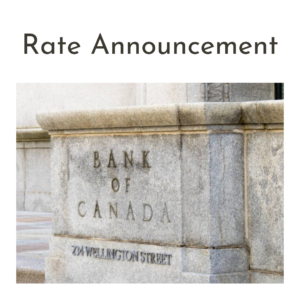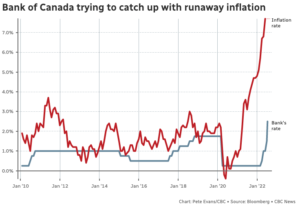
How Bridge Financing Works.
In life, things don’t always go as planned. This is especially true when it comes to real estate! When it comes to buying a new home, in a perfect world, most of us would like to take possession of their new residence before having to move out of the old one. This makes moving a lot easier and allows you time for painting or renovations prior to moving into your new home. Unfortunately, this is where things get complicated.
Most people need the money from the sale of their existing property to come up with the down payment for their new one. This is where bridge financing comes in. Essentially, bridge financing allows you to ‘bridge’ the financial gap between the firm sale of your current home and the firm commitment to purchasing your new home.
WHAT ARE BRIDGE LOANS?
Bridge loans are short-term solutions that range from 90 days to 12 months. This type of financing allows you to access some of the equity in your existing property to put towards the down payment of your new home. To be eligible for a bridge loan from a typical bank or mortgage lender, a firm sale agreement must be in place on your existing home, meaning all subjects have been removed. You will also require a purchase agreement for the new home to verify the amount required. Without a firm sale agreement, there are borrowing solutions available but at a higher cost through private lenders.
If you are currently looking to sell one property and buy another, it is important to consider whether you can qualify and pay for two mortgages at once if necessary. There are a number of reasons for this including:
- Property values are constantly changing. You won’t know how much money you have until you sell your home as a home is only worth what someone is willing to pay for it. Past sales and future guesses are not reliable means of arriving at a current property value.
- If the proceeds from your existing home are required to help pay for the down payment on your new home, as well as renovations and moving costs bridge financing is not always straightforward and does not address every situation equally
Securing bridge financing
If you have sold your existing home but the closing date comes after the closing date of the new property you just purchased, then bridge financing can sometimes address the issue.
If you have firm sale and purchase agreements and want to move forward with bridge financing, you will need to ensure your lender can accommodate this type of transaction.
COSTS OF BRIDGE FINANCING
Bridge financing typically costs more than a traditional mortgage and can cost between Prime plus 2 to 5 percent, and can also come with an administration fee.
In some cases, if you require a loan over $200,000 or a loan for more than 120 days, your lender may register a lien on the property until the loan is repaid. To remove this lien, you will need to consider the added costs of paying for a real estate lawyer.
PRIVATE FINANCING
If you are moving ahead on the purchase of your new property without selling your existing one first, and the proceeds of the sale of your current home are required for your down payment, you would have to proceed with a higher cost private loan vs. being able to work with a bank or regular mortgage lender.
Private financing is expensive, but it is generally a more affordable option than lowering the sale price of your current home and greatly reducing it in price just to sell it quickly.
COSTS OF PRIVATE FINANCING
Private loans have a much higher interest rate than traditional mortgages and come with lender fees in addition to brokerage fees. These amounts will vary based on your specific situation considering the timing and duration of the loan, the loan amount, the amount of the loan relative to the value of the new property and the equity in the current one, your credit, property details, and other potential factors and terms.
When it comes to bridge financing and selling and buying of your home, there can be a number of hoops and not all lenders will address the situation equally. All financing is always ultimately subject to lender approval and I’m always here to help determine your best options.









